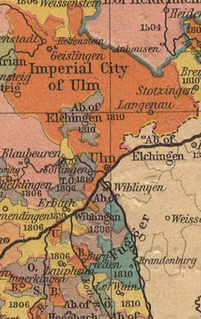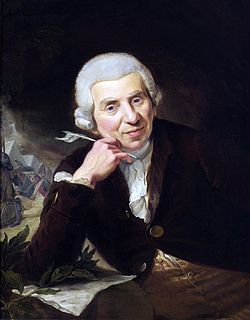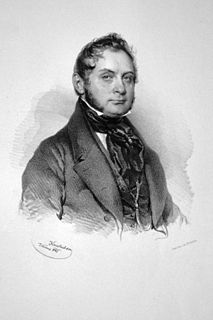
The Brothers Grimm, Jacob Ludwig Karl Grimm (1785–1863) and Wilhelm Carl Grimm (1786–1859), were Hessian academics, philologists, cultural researchers, lexicographers and authors who together collected and published folklore during the 19th century. They were among the first and best-known collectors of German folk tales, and popularized traditional oral tale types such as "Cinderella", "The Frog Prince", "The Goose-Girl", "Hansel and Gretel", "Rapunzel", "Little Red Riding Hood", "The Wolf and the Seven Young Goats", "Rumpelstiltskin", "Sleeping Beauty", and "Snow White". Their classic collection, Children's and Household Tales was published in two volumes; the first was in 1812 and the second was in 1815.

Fugger is a German upper bourgeois family that was historically a prominent group of European bankers, members of the fifteenth- and sixteenth-century mercantile patriciate of Augsburg, international mercantile bankers, and venture capitalists. Alongside the Welser family, the Fugger family controlled much of the European economy in the sixteenth century and accumulated enormous wealth. The Fuggers held a near monopoly on the European copper market.

Johann Wilhelm Ludwig Gleim was a German poet, commonly associated with the Enlightenment movement.
This is a list of music-related events in 1803.

Johann GottfriedHerder was a German philosopher, theologian, poet, and literary critic. He is associated with the Enlightenment, Sturm und Drang, and Weimar Classicism.

The Diocese of Basel is a Roman Catholic diocese in Switzerland.

Moritz Karl Wilhelm Anton Graf von Strachwitz was a German lyric poet.
Silvio Blatter is a Swiss writer.

Feind Hört Mit is an album by Austrian heavy metal band Stahlhammer. It was released on 27 April 1999. The album's text is largely written in a font of Cyrillic letters, though the words are German. The limited edition was limited to only 2,000 copies each with a number on the back.
Estonian literature is literature written in the Estonian language The domination of Estonia after the Northern Crusades, from the 13th century to 1918 by Germany, Sweden, and Russia resulted in few early written literary works in the Estonian language. The oldest records of written Estonian date from the 13th century. Originates Livoniae in Chronicle of Henry of Livonia contains Estonian place names, words and fragments of sentences. The Liber Census Daniae (1241) contains Estonian place and family names. The earliest extant samples of connected Estonian are the so-called Kullamaa prayers dating from 1524 and 1528. The first known printed book is a bilingual German-Estonian translation of the Lutheran catechism by S.Wanradt and J. Koell (1535). For the use of priests an Estonian grammar was printed in German in 1637. The New Testament was translated into southern Estonian in 1686. The two dialects were united by Anton Thor Helle in a form based on northern Estonian. Writings in Estonian became more significant in the 19th century during the Estophile Enlightenment Period (1750–1840).
Volkslied is a genre of popular songs in German which are traditionally sung. While many of them were first passed orally, several collections were published from the late 18th century. Later, some popular songs were also included in this classification.
Zupfgeigenhansel was a German folk duo, one of the most successful groups to emerge on the German folk scene in the 1970s. It consisted of Erich Schmeckenbecher and Thomas Friz. The group was named after the collection of folk songs of the same name, which was published in 1909.

"Kein schöner Land in dieser Zeit" is a popular Volkslied in German. It goes back to a song by Anton Wilhelm von Zuccalmaglio, first published in 1840 in a folk song collection. It gained popularity in the 1910s in the Wandervogel movement, and is now part of most song books in German. It has been set to choral music and modern songs. The beginning of the first line has been used as the title of books, a play and television series.

The Gleimhaus in Halberstadt is one of the oldest literary museums in Germany. It was built in 1862 in the former home of the poet and collector Johann Wilhelm Ludwig Gleim (1719-1803). The half-timbered house lies behind the choir of the gothic cathedral to Halberstadt. The collections of the Gleimhaus go back to Gleim's estate.

"Die Blümelein sie schlafen" is a German lullaby, entitled "Sandmännchen" (Sandman), composed by Johannes Brahms. He also composed other lullabies, such as "Wiegenlied".

Friedrich Wilhelm Arnold was a German musician, music seller, publisher and folk-song collector.
Werner Hübschmann was a German composer and docent.
Norbert Linke is a German composer and musicologist.
Franz Johann Karl Andreas Kretzschmer was a German lawyer, secret war councilor, composer, musicologist and folk song researcher. His main folkloristic work, the Volkslied collection of 1838/40, he published under the name "A. Kretzschmer"; In a modern reprint from 1969, this name form is wrongly transformed to "August Kretzschmer".
Günter Wewel is a German operatic bass and television presenter. Based at the Opernhaus Dortmund for decades, he performed 80 roles in Germany and Europe. He is known for presenting the television series Kein schöner Land, with more than 150 episodes, which portrays regions in Europe, their landscape, people and folklore, and was filmed at the locations.











